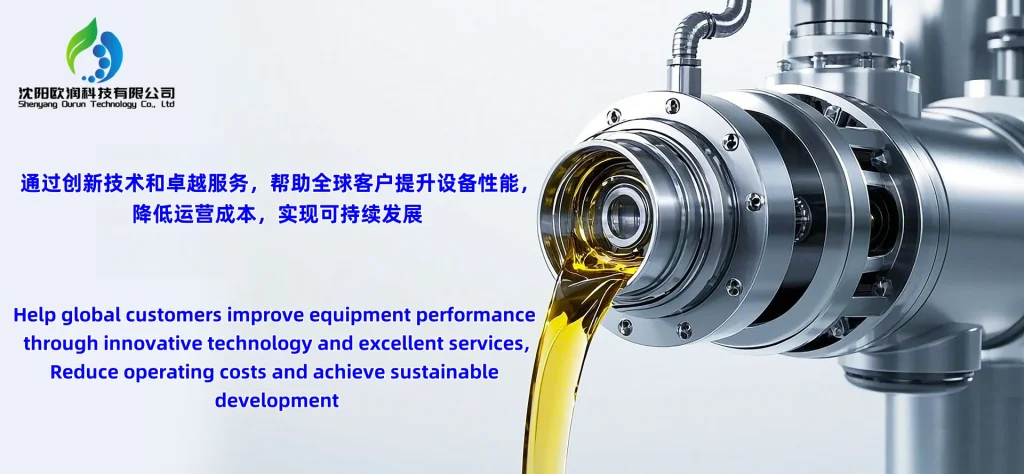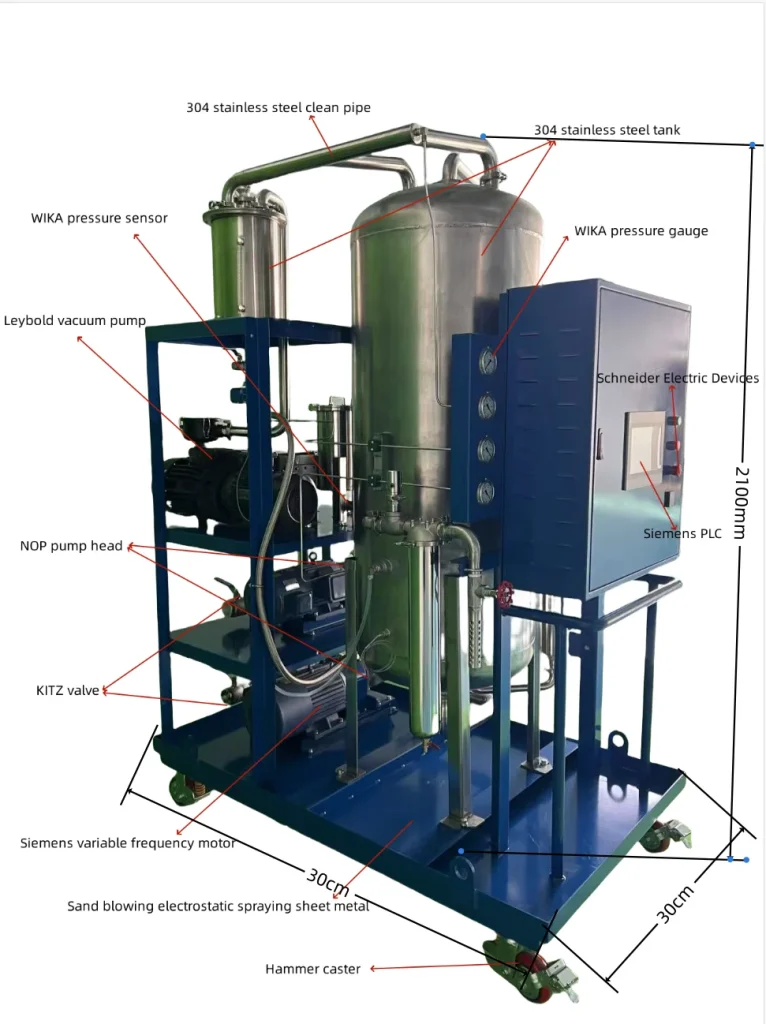
Машины для очистки масла, такие как ОУРУН-КОРС-308С и ОУРУН-КОРС-70Играют жизненно важную роль в оказании помощи промышленному оборудованию, которое длится и остается в эксплуатации. Эти системы очищают масло, удаляя вредные вещества, такие как вода, воздух и грязь. Они используют умные методы, такие как вакуумное обезвоживание, дегазирование и многоступенчатые масляные фильтры. Это предотвращает износ, гидравлические проблемы и электрические сбои в маслах. Преимущества очевидны: более низкие затраты на ремонт, более долговечное масло и соответствие высоким стандартам чистоты, таким как ISO/NAS. От электростанций до заводов эти машины работают непрерывно, часто с IoT для интеллектуального обслуживания. Благодаря моделям, созданным для различных масел и жестких условий, очистка масла сокращает время простоя, поддерживает экологически чистые методы и экономит деньги.
Что происходит, когда нефть загрязнена в промышленном оборудовании?
Грязное масло является большой проблемой для машин, которые полагаются на смазочные или гидравлические системы. Вода, воздух и крошечные частицы проникают в масло из окружающей среды, изношенных частей или во время ремонта. Эти загрязнители ускоряют ржавку, ослабляют масляные добавки и делают масло менее стабильным. В результате машины изнашиваются быстрее, ржавчина формируется, клапаны действуют, и системы могут сбиться.
ОУРУН-КОРС-308С – это высококачественная система масляного фильтра. Он удаляет воду и грязь с большой точностью. Это очень важно, потому что даже небольшое количество воды может вызвать электрические проблемы в трансформаторных маслах или пузырях в гидравлических системах.
Как системы очистки нефти останавливают эти проблемы?
Машины для очистки масла справляются со всеми основными типами загрязнителей: водой (свободной и растворенной), воздухом и твердыми кусочками. Процесс начинается с вакуумной обезвоживания. В камере низкого давления вода кипит при более низкой температуре. Это позволяет как видимой, так и скрытой воде превращаться в пар, не нанося ущерба макияжу масла.
Устройство использует вакуум для эффективного извлечения свободной воды и растворенной влаги. Он может удалить 100% свободной воды и масла пузырькиплюс до 80% растворенной воды.
В то же время вращающиеся силы или тонкие масляные фильтры улавливают крошечные твердые куски, вплоть до сверхмалых размеров. Этот двухэтапный или трехэтапный процесс гарантирует, что масло соответствует строгим правилам чистоты, таким как NAS1638 Class 5-7.
Какие загрязнители могут удалить современные масляные фильтры?
Машины для очистки масла построены для обработки многих видов загрязнителей:
- Бесплатная вода & Растворенная влагаВакуумные системы обезвоживания снижают воду до ≤50 ppm после обработки.
- Воздух и ГазыДегазирующие камеры под вакуумом удаляют воздушные пузыри, захваченные в масле.
- Твердые битыВысокоточные масляные фильтры улавливают металлические бритвы, пыль, углерод и шлам, даже крошечные.
- Остатки окисленияНекоторые системы также останавливают накопление кислоты, очищая вредные продукты окисления, которые нарушают качество масла.
OURUN-KOR-106C имеет специальный элемент масляного фильтра YSO100. Он захватывает загрязнители, которые обычные фильтры часто пропускают.
Каковы основные факторы, способствующие достижению этих результатов?
Почему вакуумная дегидратация в сочетании с дегазированием настолько важна?
Вакуумное обезвоживание не только удаляет видимую воду. Он нацелен на крошечную растворенную влагу, которая вызывает ржавую на деталях машины. Дегазирующие камеры также вытащивают воздушные пузырьки. Эти пузырьки могут повредить насосы или гидравлические части, если они остаются в масле.
ОУРУН-КОРС-70 использует передовую технологию вакуумной обезвоживания. Он полностью удаляет свободные пузырьки воды и газа из масла.
Как многоступенчатые масляные фильтры справляются с тяжелой грязью без забора?
Многослойные масляные фильтры захватывают частицы шаг за шагом, от больших кусков до крошечных кусков. Это предотвращает забор, сохраняя плавный поток масла. Спининговые сепараторы также помогают уменьшить потребность в одноразовых фильтрах.
- Высокая емкость грязиЦентрифугальный барабан содержит более 1 кг примесей.
Может ли отопление исправить диэлектрическую прочность в трансформаторных маслах?
- Да. - Да. Для изоляционных масел, используемых в трансформаторах или конденсаторах, безопасное нагревание кратко снижает толщину масла. Это способствует удалению воды и восстанавливает электрическую прочность, не нанося ущерба маслу.
Как чистое масло делает оборудование длительным?
Почему чистое масло уменьшает износ и слезы?
Чистое масло удаляет грубые частицы и коррозионные вещества из петель машины. Это приводит к более плавному контакту между движущимися частями. Он сокращает тепло от трения и крошечного повреждения поверхности, что часто приводит к сбоям подшипников.
Масло чистится, чтобы соответствовать самым высоким стандартам чистоты в промышленности.
Почему гидравлические системы настолько чувствительны к грязному маслу?
Гидравлические клапаны работают с очень плотными пробелами. Даже небольшие частицы могут застрять клапаны или вызвать утечки. Чистое масло обеспечивает стабильную работу и предотвращает внезапные отключения из-за проблем с клапаном.
Как передовые масляные фильтры предотвращают ранний сбой деталей?
Чистое масло прекращает изнашиваться до того, как оно начинается, вместо того, чтобы просто заменить плохое масло позже. Этот активный подход замедляет повреждение насосов, передач, уплотнений и приводов. Это также снижает общую стоимость владения оборудованием.
Может ли постоянная фильтрация увеличить время работы?
Как непрерывная фильтрация сокращает неожиданное время простоя?
Постоянная фильтрация масла предотвращает накапливание загрязнителей между проверками технического обслуживания. Это приводит к меньшему количеству аварийных ремонтов и более длительному времени между сбоями (MTBF).
- Случаи использования: Серия отлично работает для непрерывной фильтрации в системах смазки оборудования.
Как умные масляные фильтры помогают в прогнозируемом обслуживании?
С Мониторинг на основе PLCЭти системы отправляют предупреждения, если поток нефти или уровень грязи меняются. Это поддерживает планируемое обслуживание вместо внезапных вызовов по ремонту.
Какие отрасли больше всего получают от этих систем?
Электростанции используют их для трансформаторных масел. Фабрики полагаются на них для гидравлики ЧПУ. Нефтегазовые операции используют их для смазки турбин. Все видят большую надежность.
Сложно ли добавить эти машины к существующим системам?
Работают ли эти машины со всеми маслами?
Современные масляные фильтры работают со многими маслами, включая гидравлические масла (ISO VG), масла передач (EP), турбинные масла (R & amp; O), компрессорные масла и даже пожаростойкие жидкости, такие как фосфатные эстери или гликолы.
- Ассортимент маслаЭффективный для масел с вязкостью от 1 до 680 мм²/с.
Что делать, если у сайта сложные условия?
Доступны индивидуальные варианты, такие как мобильные блоки для отдаленных районов или нержавеющие конструкции из нержавеющей стали 304 для оффшорных объектов. Они надежно обрабатывают температуры от -40°C до 300°C.
Могу ли я проверить производительность от Afar?
- Да. - Да. Встроенные ПЛК позволяют удаленную проверку через платформы SCADA или IoT. Это соответствует тенденциям умных заводов во всем мире.
Есть ли экономия за пределами чистой нефти?
Как часто нужно заменять нефть этими системами?
Гораздо реже. Постоянная очистка сохраняет масло чистым в соответствии со стандартами ISO/NAS в течение длительного периода времени. Полная смена масла становится редкой.
- ЭкономияМеньше рабочей силы, меньшие затраты на обслуживание и гораздо меньше расходов на новую нефть.
Со временем снизятся ли расходы на обслуживание?
Конечно. Меньше сбоев означает меньше запасных частей и меньше сверхуроков для фиксации машин во время напряженного производства.
Помогает ли это достичь экологических целей?
- Да. - Да. Меньшее удаление отходов масла означает меньший экологический след. Это соответствует глобальным зеленым стандартам.
Какую модель выбрать для своих потребностей?
Выберите OURUN-KORS-308C для высоковязких масел в критически важных машинах, таких как турбины или компрессоры, где точность имеет ключевое значение.
Для больших работ по обезвоживанию на центральных смазочных станциях или трансформаторных фермах, перейдите на ОУРУН-КОРС-70. Он построен для выполнения крупных задач в тяжелых условиях с быстрым удалением воды.
Обе модели предлагают:
- Умный контроль PLC
- Поддержка широкой вязкости (до 680 cSt)
- ≤50 ppm влага после обработки
- Дополнительные отоплительные блоки
Куда дальше идет эта технология?
Какую роль будет играть IoT в будущих моделях?
Ищите облачные панели, которые показывают тенденции грязи в реальном времени. Это поможет сделать более умный выбор обслуживания.
Новые фильтры появляются?
- Да. - Да. Новые нановолоконные мембраны захватят даже меньшие частицы без замедления потока масла. Это продлит срок службы фильтра и потребляет меньше энергии.
Есть ли работа по повышению надежности систем?
Конечно. Основное внимание уделяется более жестким конструкциям для экстремальных условий и функциям самопроверки для сокращения времени простоя.
Часто задаваемые вопросы
Q1: Может ли это оборудование работать без остановки моей системы?
О: Да. Многие модели построены для бесперебойной фильтрации масла. Ваше оборудование продолжает работать во время чистки.
Q2: Как узнать, нужна ли мне вакуумная обезвоживание или просто обычные масляные фильтры?
Ответ: Если в вашей системе много воды, например, в паровых турбинах или наружных трансформаторах, вакуумная обезвоживание является ключом. Регулярные фильтры не могут хорошо удалить скрытую влагу.
Q3: Есть ли детали, которые я должен часто заменять?
A: Некоторые блоки используют спинирующее разделение, поэтому не требуется фильтр. Фильтрация с нулевым потреблением: не требуются запасные части. Другим может потребоваться замена фильтровых картриджей время от времени, в зависимости от конструкции.







